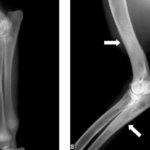 There are a number of reasons your canine companion might be favoring a leg. If lameness persists more than 24 hours, it should be brought to the attention of your family veterinarian.
There are a number of reasons your canine companion might be favoring a leg. If lameness persists more than 24 hours, it should be brought to the attention of your family veterinarian.
Below are some of the common reasons for lameness:
Medical/Infectious:
-Tick borne disease can results in shifting leg lameness
-Auto-immune inflammatory disease such as poly arthritis can cause lameness
-Hypertrophy Osteodystrophy – non-infectious, self-limiting but painful disease of young growing dogs/pupies
Neoplasia/Cancer:
Older dogs and certain breeds of young dogs can succumb to bone or cartilage cancer such as osteosarcoma or chrondrosarcoma
Orthopedic issues:
-Common causes of lameness include ligament tears such as a tear of the cranial cruicate ligament
-Hip dysplasia (usually larger breed dogs including retrievers)
-Luxating patellas (knee instability)
-Osteoarthritis – often older dogs after years of wear and tear
Soft tissue injuries such as a sprain can also occur and usually heals on its own with veterinary ant-inflammatory and pain medications along with exercise restriction.
There are other causes of lameness but this covers the more common issues. If your dog is lame, call Urban Animal and schedule an appointment to help figure out the cause and put together a treatment plan.


